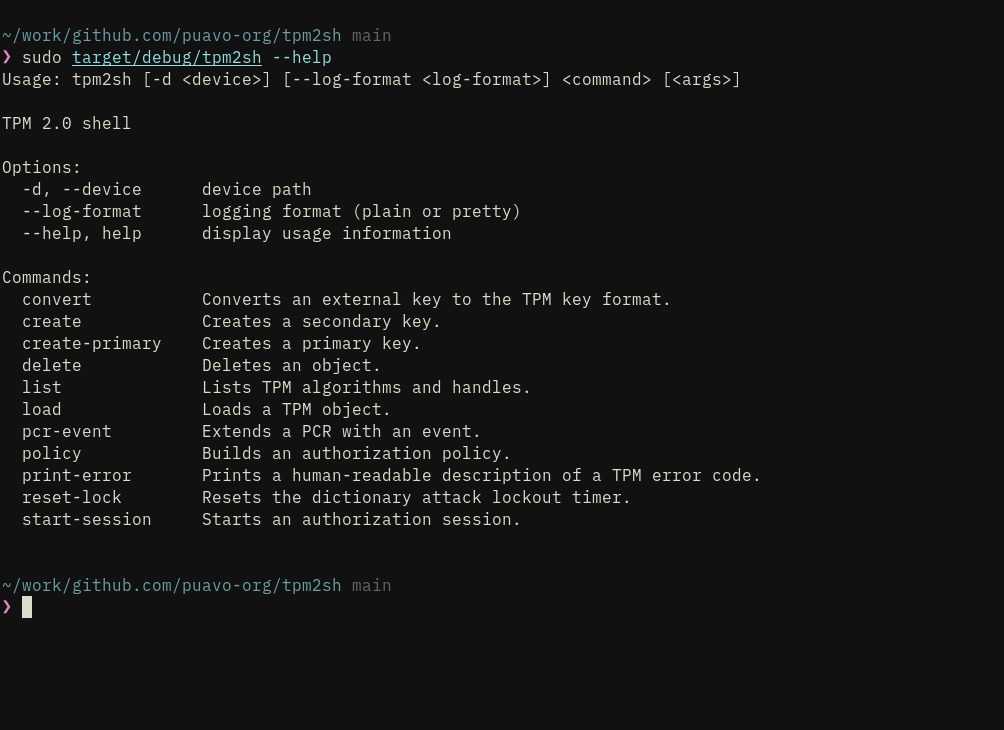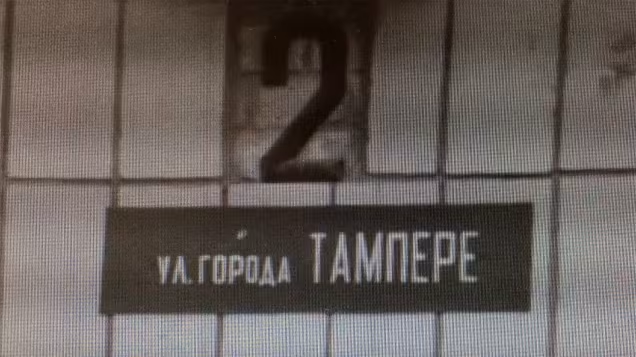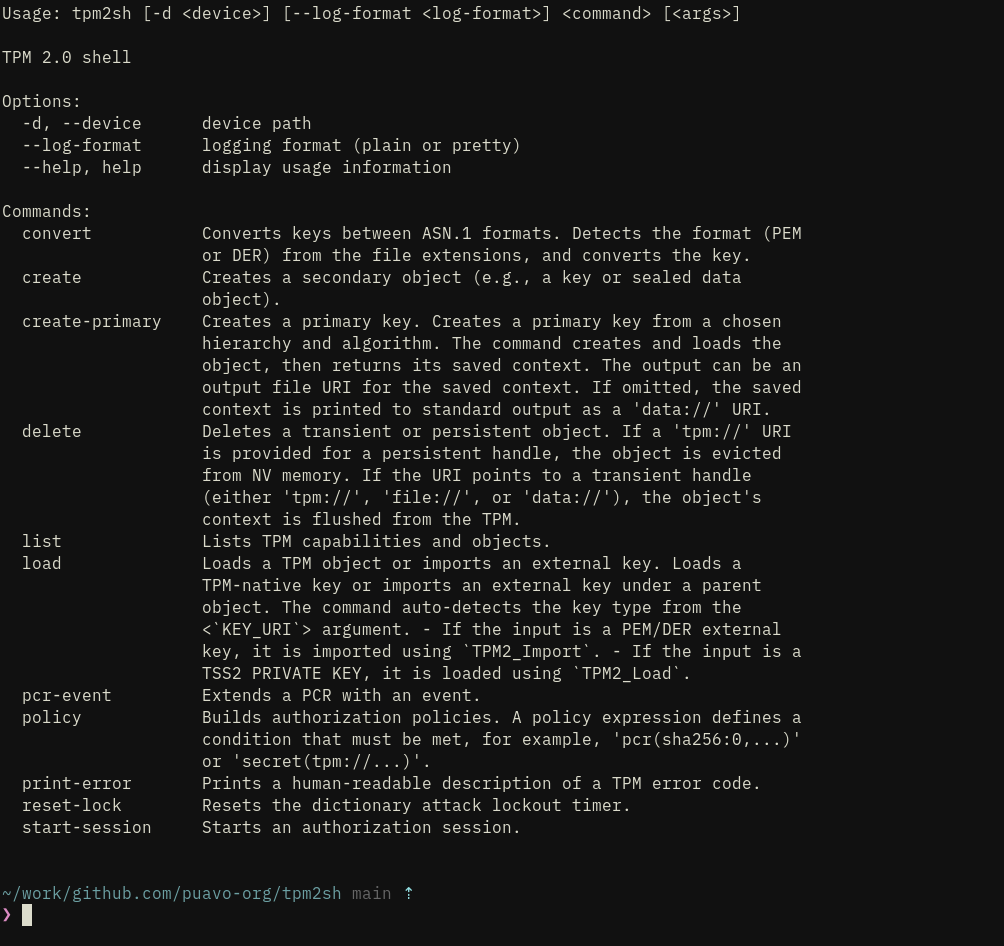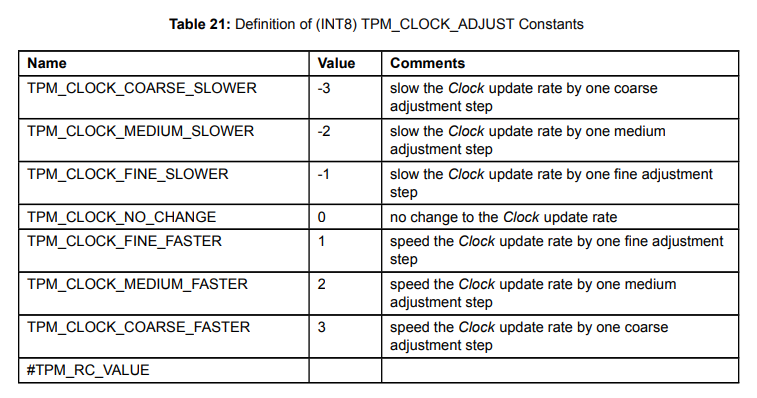Posts
5114Following
331Followers
505OpenPGP: 3AB05486C7752FE1
Jarkko Sakkinen
jarkkohttps://github.com/puavo-org/tpm2sh/issues/2
Many of the things are just minor collapses while turning this over and over again. Sessions need still a bit of work but lot of the functionality is already there...
I'd like to add quote generation etc. for Remote Attestation purposes but it is definitely out of scope and better just to stabilize the command set.
Sessions are represented like this (to be cosmetic tweaked in some places):
session://handle=0x02000000;nonce=135eac83db00e0c691fba1653405e79f8f285964e18add0488337fc7caf90606;attrs=00;key=;alg=sha256
And there's already `--session` argument but further I'll add an environment variable TPM2SH_SESSION, which command not only read but also update (to enable chaining e.g., nonce needs to be updated).
The general gist and main goal of the command set and "command-line experience" is to enable both user interactive experience and also TPM2 access for shell implemented tools such as password managers.
Load loads both external PKCS#8 and TPM ASN.1. Convert command converts PKCS#8 to TPM ASN.1.
So instead of this:
tpm2_createprimary --hierarchy o -G rsa2048 -c owner.txt
tpm2_evictcontrol -c owner.txt 0x81000001
openssl genrsa -out private.pem 2048
tpm2_import -C 0x81000001 -G rsa -i private.pem -u key.pub -r key.priv
tpm2_encodeobject -C 0x81000001 -u key.pub -r key.priv -o key.priv.pem
openssl asn1parse -inform pem -in key.priv.pem -noout -out key.priv.der
You can just:
tpm2sh create-primary rsa:2048:sha256 --output file://owner.txt
openssl genrsa -out private.pem 2048
tpm2sh convert --parent "tpm://0x81000001" file://private.pem --output file://key.priv.der
#linux #rust #tpm
Jarkko Sakkinen
jarkko1. last year it was 70th anniversary of twin town friendship between tampere and kiova (tampere is my hown town).
2. kiova has a street called "tampere", which was named in 2014 to celebrate 60th anniversary of friendship, which has lasted well over its "soviet origins".
my generation does not know what it is like to be at war obviously and it would be obnoxious to say that "i get it" when it comes to war at ukraine. however, we owe to our grandparents to not forget, not make compromises and generally not to be ignorant of the situation.
🇺🇦 🇫🇮
Jarkko Sakkinen
jarkkoThe current feature set of upcoming tpm2sh 0.11. It’s quite basic but everything is tested with care and e.g., load does all the import dance for PKCS8 RSA and ECC keys without having to mess with openssl command line. I.e. single robust load command instead of:
tpm2_createprimary --hierarchy o -G ecc -c owner.txt
tpm2_evictcontrol -c owner.txt 0x81000001
openssl ecparam -name prime256v1 -genkey -noout -out private.pem
tpm2_import -C 0x81000001 -G ecc -i private.pem -u key.pub -r key.priv
tpm2_encodeobject -C 0x81000001 -u key.pub -r key.priv -o key.priv.pem
openssl asn1parse -inform pem -in key.priv.pem -noout -out key.priv.der
And generally flows are somewhat polished and will be polished further before released to not have any rough corners. Finally most of non-trivial functionality is tested against built-in TPM emulator MockTPM.
Sometime after 0.11 release I’ll add also --dry-run switch that can exercise TPM commands with the emulator before applying them to the chip.
Jarkko Sakkinen
jarkkohttps://github.com/puavo-org/tpm2sh/blob/main/src/key/tpm_key.rs
It took me like 30 minutes after reading tutorial a bit get ongoing.
Jarkko Sakkinen
jarkkogreat now i have a single data-drive test where test cases translate between legacy (build/parse) and new (zerocopy fat pointers):
# ...
TPM_CC_Startup Response TPM_RC_FAILURE 80010000000a00000101
TPM_CC_Startup Response TPM_RC_CONTEXT_GAP 80010000000a00000901
TPM_CC_PCR_Read Response Success 800100000038000000000000000100000000000000010020dededededededededededededededededededededededededededededededed
# ...
Jarkko Sakkinen
jarkkohttps://lore.kernel.org/linux-integrity/aMboFXNNX7WZaOaS@kernel.org/
PoC: https://github.com/puavo-org/tpm2sh/commit/18ec3c2169b23523d8866c58fa7b8a89a79bd3d4
#linux #kernel #tpm
Jarkko Sakkinen
jarkkohttps://git.kernel.org/pub/scm/linux/kernel/git/jarkko/tpm2-protocol.git/commit/?id=4f48396e0df888ee6a5e8a2df92d71cfc05d26d8
After this it is downhill.
I'm doing this like an idiot, i.e. learning as I bump e.g., up until yesterday I was not even aware of Ref and Deref trait :-)
Jarkko Sakkinen
jarkkoawesome “cast” version of tpm_enum!:
tpm_enum_cast! {
name: TpmRcBaseCast,
repr: TpmUint32,
value_enum: TpmRcBaseEnumCast,
value_repr: u32,
variants: {
(Success, 0x0000, "TPM_RC_SUCCESS"),
(BadTag, 0x001E, "TPM_RC_BAD_TAG"),
(Initialize, TPM_RC_VER1, "TPM_RC_INITIALIZE"),
(Failure, TPM_RC_VER1 | 0x001, "TPM_RC_FAILURE"),
// ...
Jarkko Sakkinen
jarkkoI could implement e.g. tpm2-protocol by using that as dependency but never could reach optimal results for the underlying data.
Jarkko Sakkinen
jarkkoCast version TPM structures starts to shape:
use crate::{tpm_struct_cast, TpmUint32, TpmUint64, TpmUint8};
tpm_struct_cast! {
name: TpmsClockInfoCast,
field_enum: TpmsClockInfoField,
field_ref_enum: TpmsClockInfoFieldRef,
fields: {
(pub clock: TpmUint64<'a>),
(pub reset_count: TpmUint32<'a>),
(pub restart_count: TpmUint32<'a>),
(pub safe: TpmUint8<'a>),
}
}
And after migration is completed:
use crate::{tpm_struct_cast, TpmUint32, TpmUint64, TpmUint8};
tpm_struct! {
name: TpmsClockInfo,
field_enum: TpmsClockInfoField,
field_ref_enum: TpmsClockInfoFieldRef,
fields: {
(pub clock: TpmUint64<'a>),
(pub reset_count: TpmUint32<'a>),
(pub restart_count: TpmUint32<'a>),
(pub safe: TpmUint8<'a>),
}
}
Jarkko Sakkinen
jarkkoJarkko Sakkinen
jarkkohttps://git.kernel.org/pub/scm/linux/kernel/git/jarkko/tpm2-protocol.git/commit/?id=a0f2b3b7f70f6d1151a85c1fadaac5f181e09d91
I'm just learning Rust while doing, really discovered Deref and DerefMut while doing this transformation.
Jarkko Sakkinen
jarkko1. Ext4
2. FAT (and its various upgrades)
There's no operating system that could not read them I'm aware of.
Within last 20 years I've never had a situation where I'm in trouble because my machine does not have "advanced filesystem" :-) And basing backup strategy to local snapshots, well good luck with that. I have NAS.
Jarkko Sakkinen
jarkkoJarkko Sakkinen
jarkkono SIZE constant anymore in the new TpmSized as no stack allocation is required:
/// Provides a `dyn`-safe way to get the exact size of a zero-copy cast object.
pub trait TpmSizedCast {
/// Returns the exact serialized size of the object.
fn len(&self) -> usize;
/// Returns `true` if the object has a serialized length of zero.
fn is_empty(&self) -> bool {
self.len() == 0
}
}
This ought to be renamed as TpmSized as full migration is over :-) Applies also to all other *Cast.
Jarkko Sakkinen
jarkkohttps://git.kernel.org/pub/scm/linux/kernel/git/jarkko/tpm2-protocol.git/commit/?id=28664f46cdcf2c5527d0c3e409a292dad2501bba
now it will be downhill :-)
#linux #rust #tpm
Jarkko Sakkinen
jarkkoJarkko Sakkinen
jarkkoJarkko Sakkinen
jarkkohttps://git.kernel.org/pub/scm/linux/kernel/git/jarkko/tpm2-protocol.git/tree/src/list.rs
Jarkko Sakkinen
jarkkoIn the end of the day this is superior despite adding up a new trick to my sack of random macro hacks:
tpm_integer!(u8, TpmUint8, Unsigned);
tpm_integer!(i8, TpmInt8, Signed);
tpm_integer!(u16, TpmUint16, Unsigned);
tpm_integer!(i32, TpmInt32, Signed);
tpm_integer!(u32, TpmUint32, Unsigned);
tpm_integer!(u64, TpmUint64, Unsigned);
Now the names match TCG specification names, and they are also first fully zerocopy migrated types. This way previously redundant looking field now is actually self-documenting field.
Other zerocopy types will get the nasty “Cast” postfix up until migration is complete (e.g., TpmBufferCast).
For the record, the last field is used to address exactly one quirk related to TCG specs: TPM_CLOCK_TIME, meaning that “invalid discriminant error” needs too versions :-/
I’m sure we would get numbers going from zero to six, and “get this complex science” as e.g., most of have ability to read, and understand nuances such as the difference between slower and faster… This is DailyWTF proximity enough level bad definition that I tend to like that TPM_CLOCK_TIME exist…



